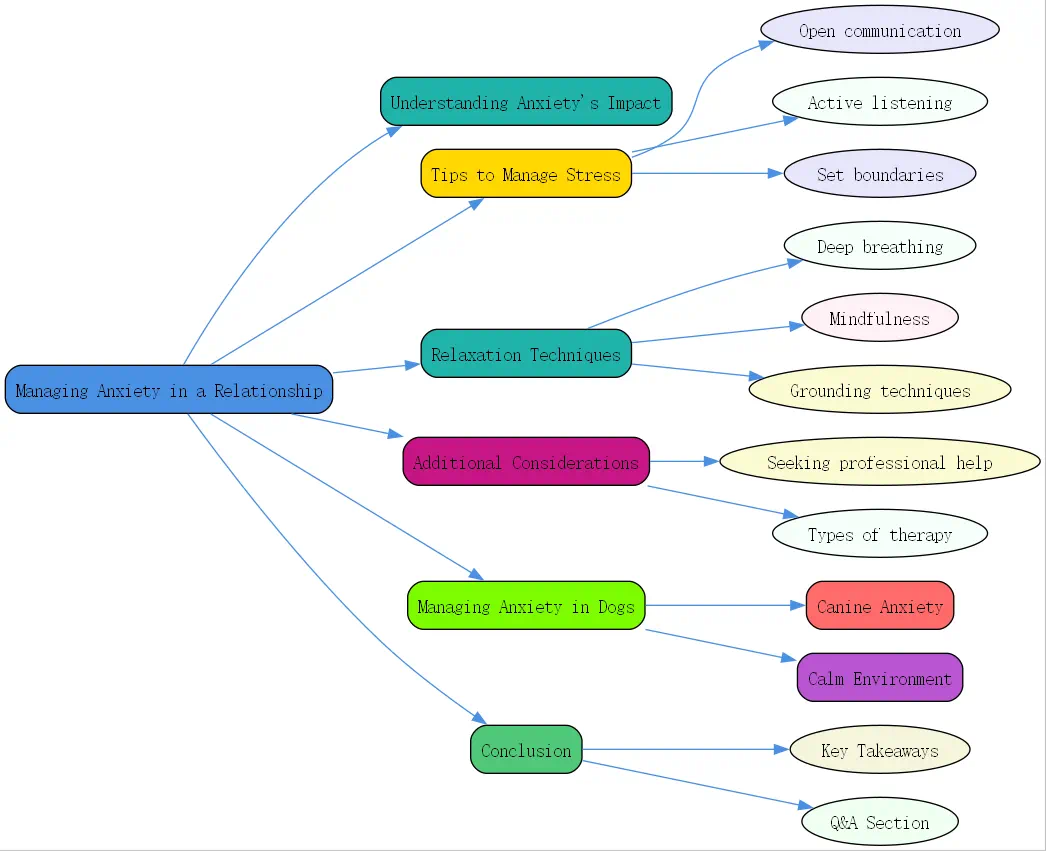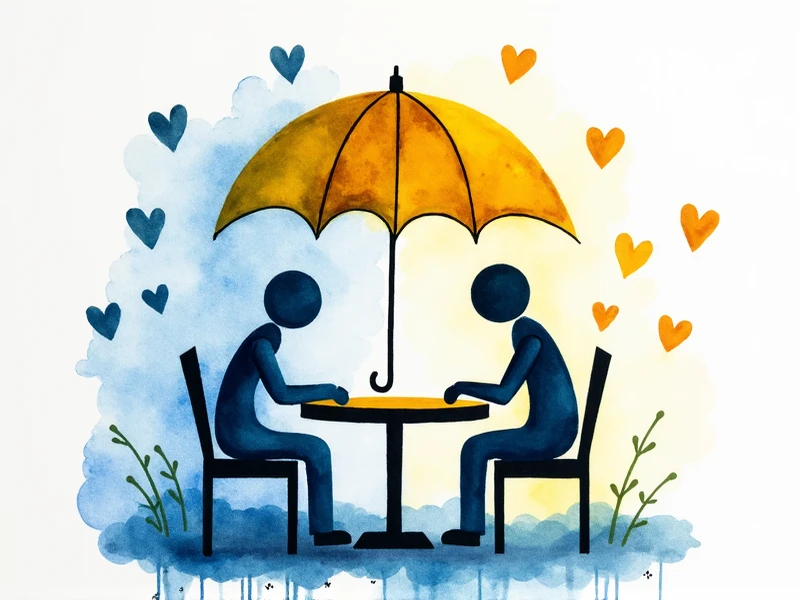Understanding Anxiety’s Impact on Relationships

Anxiety can significantly affect relationships, often leading to misunderstandings and emotional distance. Recognizing anxiety symptoms in yourself and your partner is crucial for fostering a healthy relationship. Common signs include irritability, withdrawal, and difficulty concentrating. When anxiety goes unaddressed, it can manifest as stress, impacting communication and intimacy.

Understanding how anxiety affects both partners is essential. For instance, one partner may become overly anxious about minor issues, leading to unnecessary conflict. Conversely, the other partner may feel helpless or frustrated, not knowing how to support their loved one. By acknowledging these patterns, couples can work together to address anxiety effectively.
Addressing anxiety is vital for relationship health. When both partners feel understood and supported, it creates a safe space for open communication. This openness can help alleviate anxiety and strengthen the bond between partners, making it easier to navigate challenges together.
Tips to Manage Stress and Anxiety in Your Relationship
Open and Honest Communication: The Foundation
Communication is the cornerstone of any relationship, especially when managing anxiety. Openly discussing feelings and fears allows both partners to understand each other better. Use “”I feel”” statements to express emotions without placing blame. For example, saying, “”I feel anxious when we argue”” is more constructive than, “”You always make me anxious.””
Practicing Active Listening and Empathy
Active listening involves fully concentrating on what your partner is saying, validating their feelings, and responding thoughtfully. This practice fosters empathy, allowing partners to connect on a deeper level. When one partner shares their anxiety, the other should listen without interruption, acknowledging their feelings and offering support.
Establishing Boundaries and Expectations
Setting clear boundaries is essential for managing anxiety in a relationship. Discuss what behaviors are acceptable and what triggers anxiety for each partner. Establishing these boundaries can help create a more secure environment where both partners feel respected and understood.
Using “”I feel”” Statements to Communicate Needs
Using “”I feel”” statements is an effective way to communicate needs without sounding accusatory. For instance, saying, “”I feel overwhelmed when you don’t respond to my texts”” encourages dialogue and understanding. This approach helps both partners express their feelings while minimizing defensiveness.
Effective Relaxation Techniques for Managing Anxiety in the Moment
Deep Breathing Exercises
Deep breathing is a powerful tool for managing anxiety in the moment. When feeling overwhelmed, take a few minutes to focus on your breath. Inhale deeply through your nose for a count of four, hold for four, and exhale slowly through your mouth for four. Repeat this process several times to calm your nerves and regain focus.
Mindfulness and Meditation
Practicing mindfulness and meditation can help partners stay grounded during anxious moments. These techniques encourage individuals to focus on the present, reducing feelings of anxiety about the future. Consider setting aside time each day for mindfulness exercises or meditation to foster a sense of calm and connection.
Grounding Techniques
Grounding techniques can help individuals feel more connected to their surroundings, reducing anxiety. Try focusing on your senses: identify three things you can see, two things you can touch, and one thing you can smell. This practice can help bring awareness back to the present moment and alleviate feelings of anxiety.
Physical Activity and Exercise
Regular physical activity is an excellent way to manage anxiety. Exercise releases endorphins, which can boost mood and reduce stress. Encourage each other to engage in physical activities together, whether it’s going for a walk, attending a fitness class, or practicing yoga. This shared experience can strengthen your bond while promoting mental well-being.
Additional Considerations for Managing Anxiety
Seeking Professional Help
Sometimes, managing anxiety in a relationship may require professional assistance. Recognizing when to seek therapy or counseling is crucial. If anxiety is affecting communication, intimacy, or overall relationship satisfaction, consider reaching out to a qualified therapist.
Types of Therapy Beneficial for Relationship Anxiety
There are various types of therapy that can help couples manage anxiety. Cognitive Behavioral Therapy (CBT) is effective for addressing negative thought patterns, while Emotionally Focused Therapy (EFT) focuses on improving emotional connection. Couples therapy can provide a safe space for partners to explore their feelings and develop healthier communication strategies.
Finding a Qualified Therapist
When seeking professional help, it’s essential to find a qualified therapist who specializes in anxiety and relationships. Look for licensed professionals with experience in couples therapy. Many therapists offer initial consultations, allowing you to assess whether their approach aligns with your needs.

Supporting Your Partner with Anxiety
Supporting a partner with anxiety requires patience and understanding. Learn about their specific triggers and how anxiety manifests for them. Offering reassurance and validation can help your partner feel more secure. Encourage them to seek professional help if needed, but do so without pressure.
Managing Anxiety in Dogs: A Parallel to Human Relationships
Interestingly, managing anxiety in dogs can provide valuable insights into human relationships. Just as humans experience anxiety, dogs can also suffer from it, impacting their behavior and interactions. Understanding canine anxiety can help couples create a calm and supportive environment for their pets and themselves.
Understanding Canine Anxiety and Its Impact on Behavior
Dogs may exhibit anxiety through destructive behavior, excessive barking, or withdrawal. Recognizing these signs is crucial for addressing their needs. Just as with human anxiety, understanding the root cause of a dog’s anxiety can lead to effective management strategies.
Creating a Calm and Supportive Environment for Your Dog
Creating a calm environment for your dog involves minimizing stressors and providing comfort. Establish a routine, provide a safe space, and engage in regular exercise. These practices can help alleviate anxiety for both dogs and their owners, fostering a sense of security.
Consulting with a Veterinarian or Certified Dog Trainer
If a dog’s anxiety persists, consulting with a veterinarian or certified dog trainer may be necessary. They can provide guidance on behavior modification techniques and, if needed, recommend medication to help manage anxiety. This proactive approach ensures that both pets and their owners can enjoy a harmonious relationship.
Conclusion
Managing anxiety in a relationship is an ongoing process that requires open communication, empathy, and effective coping strategies. By recognizing the impact of anxiety, couples can work together to create a supportive environment. Remember, seeking professional help is always an option if anxiety becomes overwhelming.
By following these tips and techniques, you can cultivate a healthier, more fulfilling relationship. At BrainTalking, we believe that understanding and addressing anxiety can lead to stronger connections and greater emotional well-being. Don’t let anxiety stand in the way of your happiness鈥攖ake proactive steps to manage it today.
Key Takeaways
- Recognize anxiety symptoms in yourself and your partner.
- Communicate openly and use “”I feel”” statements.
- Practice relaxation techniques like deep breathing and mindfulness.
- Seek professional help when necessary.
- Support your partner by learning about their triggers and offering reassurance.
Q&A Section
Q: What are some effective ways to manage anxiety in a relationship?




